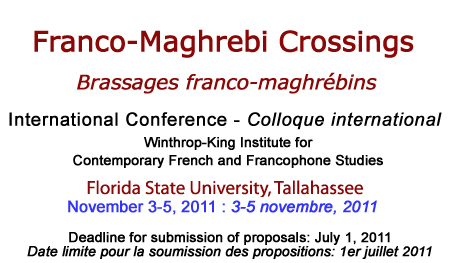
| Pour accéder aux informations en français,cliquez ici | ||
| Program | Call for Papers | Contact Us |
Special guest:
Azouz Begag
Keynote speakers:
Denise Brahimi (Université de Paris VII)
Marta Segarra (University of Barcelona)
During the colonial period and the struggle for independence, national rivalries were to the fore in relations between France and the countries of the Maghreb. Yet within each of those countries there were important political, cultural and ethnic differences on the basis of which it was customary to distinguish three main population groups: Arab and Berber Muslims, Sephardic Jews and settlers of European origin. Beyond that tripartite division, which became formally codified during the colonial period, there were other significant differences such as those between Arabs and Berbers. Each group produced distinctive forms of expression during that period. How do the literary, cinematic and other forms of artistic expression produced by each group relate to each other and to the nationalist movements at work on each side of the Mediterranean? How do they relate to wider cultural and political spaces - trans-Mediterranean, pan-Arab, Islamic, Jewish, etc. - stretching beyond the Franco-Maghrebi axis? Since the end of the colonial period, how have these differences played out in the writings, films and other forms of expression of those who have left the Maghreb and settled in France? What are the forms and relative importance of nostalgia, exile and amnesia in representations of the Maghreb among writers and other artists of Muslim, Sephardic Jewish and European (pied-noir) origin? How do they see their relations with the country in which they have settled and with wider spaces such as the Middle East and the Black Atlantic? Has expatriation brought these groups closer together or deepened the divisions between them? Where do the harkis stand: alongside rapatriés of European origin, or closer to migrant workers of Muslim heritage? What about the descendants of these expatriates? Are they perpetuating or transcending the divisions of their forbears? These are among the questions which speakers at this international conference are invited to address.
These are indicative topics, and the list is not restrictive. Proposals-in English or in French-are welcomed for individual papers or for whole panels on any topic relevant to the overall conference theme. Standard panels will normally consist of three papers. Presentations will be selected for inclusion in the conference program on the basis of merit.

